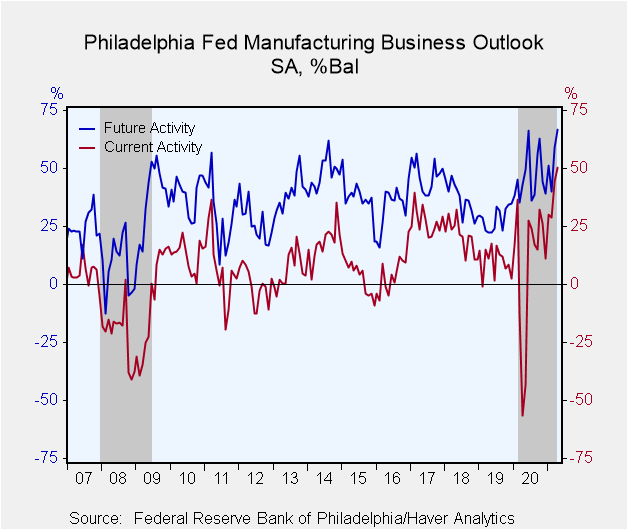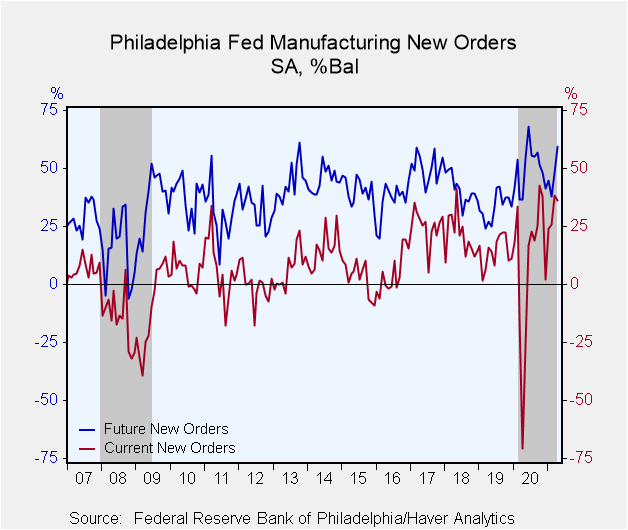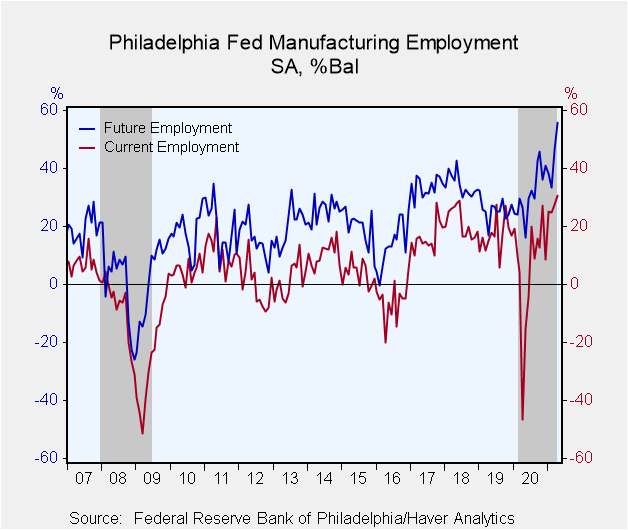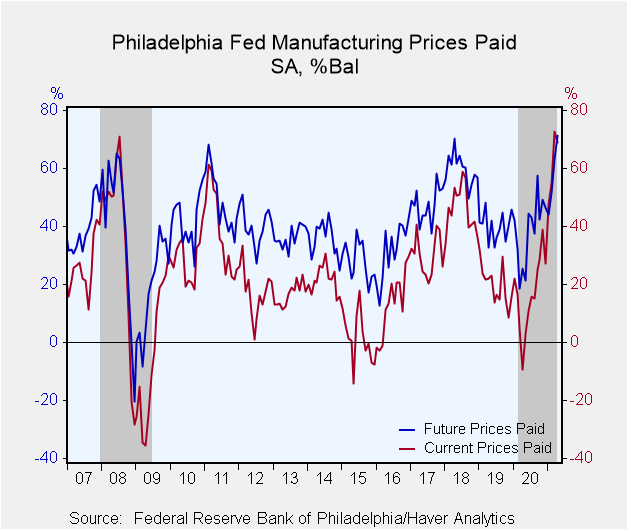 Global| Apr 15 2021
Global| Apr 15 2021Philadelphia Fed Manufacturing Index Strengthens in April
by:Tom Moeller
|in:Economy in Brief
Summary
• Headline index jumps to highest level since 1973. • Underlying strength remains widespread. • Prices paid ease. The Federal Reserve Bank of Philadelphia's Factory Sector Business Conditions Index jumped to 50.2 during April [...]
• Headline index jumps to highest level since 1973.
• Underlying strength remains widespread.
• Prices paid ease.
The Federal Reserve Bank of Philadelphia's Factory Sector Business Conditions Index jumped to 50.2 during April following a rise to a revised 44.5 in March. Earlier data also was revised. It was the highest reading since April 1973. The Action Economics Forecast Survey expected a reading of 40.0. The percentage of firms reporting improving conditions rose to 58.6% after surging to 53.9% in March, while the share reporting weaker conditions fell to a lessened 8.4%.
Haver Analytics calculates an ISM-Adjusted General Business Conditions Index using the same methodology as the national ISM index. The reading improved to 63.0, the highest level since March 1973.
Amongst the subindexes, the employment reading rose to a record 30.8. A higher 35.1% of survey respondents reported increased employment while a reduced 4.2% reported less hiring. The unfilled orders measure surged to 27.2, nearly a 50-year high. Shipments and inventories also strengthened. Falling was the new orders measure to 36.0 from 38.2 and the average workweek to 29.8 from 36.4.
On the pricing front, the index of prices paid eased to 69.1 in April from 72.6 in March, but remained up from -9.3 twelve months earlier. A slightly lessened 71.4% of respondents paid higher prices while 2.3% paid less. The index of prices received improved.
The Philadelphia Fed also surveys expectations for business activity in six months. The Future Activity Index rose to 66.6 in April from 59.1 in March. Employment, new orders and shipments rose sharply. The future prices paid measure surged to the highest level since January 1989.
The survey panel consists of 150 manufacturing companies in the third Federal Reserve District (which consists of southeastern Pennsylvania, southern New Jersey and Delaware). The diffusion indexes represent the percentage of respondents indicating an increase minus the percentage indicating a decrease in activity. The ISM-adjusted figure, calculated by Haver Analytics, is the average of five diffusion indexes: new orders, shipments, employment, delivery times and inventories with equal weights (20% each). Each ISM-adjusted index is the sum of the percent responding "higher" and one-half of the percent responding "no change."
The figures from the Philadelphia Federal Reserve dating back to 1968 can be found in Haver's SURVEYS database. The expectation from the Action Economics Forecast Survey is available in AS1REPNA.
| Philadelphia Fed - Manufacturing Business Outlook Survey (%, SA) | Apr | Mar | Feb | Apr'20 | 2020 | 2019 | 2018 |
|---|---|---|---|---|---|---|---|
| General Factory Sector Business Conditions | 50.2 | 44.5 | 28.7 | -56.6 | 7.9 | 9.9 | 20.9 |
| ISM-Adjusted Business Conditions | 63.0 | 61.4 | 61.4 | 29.7 | 52.3 | 55.5 | 57.7 |
| New Orders | 36.0 | 38.2 | 25.7 | -70.9 | 8.9 | 14.1 | 21.0 |
| Shipments | 25.3 | 22.0 | 28.0 | -74.1 | 9.7 | 16.9 | 22.8 |
| Unfilled Orders | 27.2 | 19.3 | 13.9 | -13.5 | 0.4 | 7.7 | 7.0 |
| Delivery Time | 27.8 | 28.2 | 16.1 | 4.1 | 5.1 | 9.4 | 9.5 |
| Inventories | 17.3 | 14.4 | 21.7 | -10.2 | -0.2 | 5.1 | 7.2 |
| Number of Employees | 30.8 | 27.4 | 24.9 | -46.7 | 5.0 | 16.9 | 21.5 |
| Average Workweek | 29.8 | 36.4 | 30.4 | -54.5 | 4.4 | 9.8 | 15.9 |
| Prices Paid | 69.1 | 72.6 | 55.2 | -9.3 | 16.6 | 19.7 | 46.1 |
| Expectations - General Business Conditions; Six Months Ahead | 66.6 | 59.1 | 40.0 | 43.0 | 46.3 | 28.4 | 36.8 |
Tom Moeller
AuthorMore in Author Profile »Prior to joining Haver Analytics in 2000, Mr. Moeller worked as the Economist at Chancellor Capital Management from 1985 to 1999. There, he developed comprehensive economic forecasts and interpreted economic data for equity and fixed income portfolio managers. Also at Chancellor, Mr. Moeller worked as an equity analyst and was responsible for researching and rating companies in the economically sensitive automobile and housing industries for investment in Chancellor’s equity portfolio. Prior to joining Chancellor, Mr. Moeller was an Economist at Citibank from 1979 to 1984. He also analyzed pricing behavior in the metals industry for the Council on Wage and Price Stability in Washington, D.C. In 1999, Mr. Moeller received the award for most accurate forecast from the Forecasters' Club of New York. From 1990 to 1992 he was President of the New York Association for Business Economists. Mr. Moeller earned an M.B.A. in Finance from Fordham University, where he graduated in 1987. He holds a Bachelor of Arts in Economics from George Washington University.
More Economy in Brief
 Global| Feb 05 2026
Global| Feb 05 2026Charts of the Week: Balanced Policy, Resilient Data and AI Narratives
by:Andrew Cates










